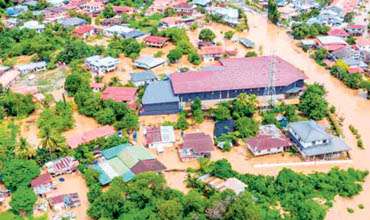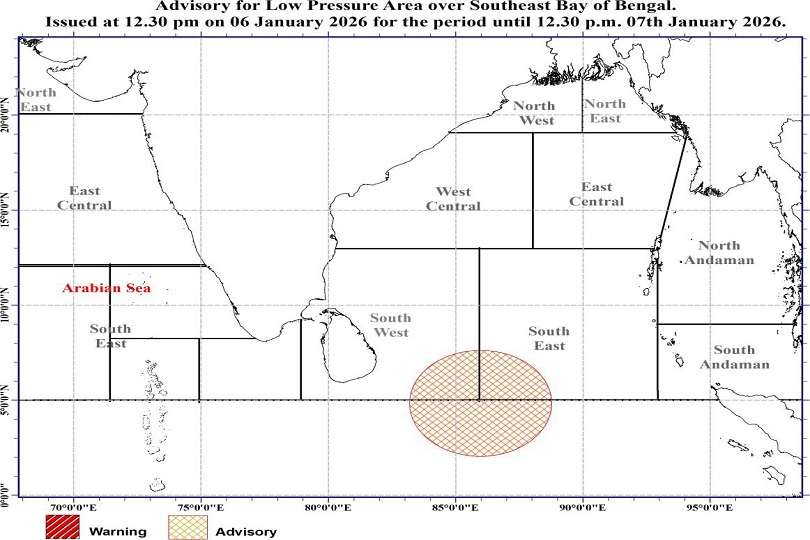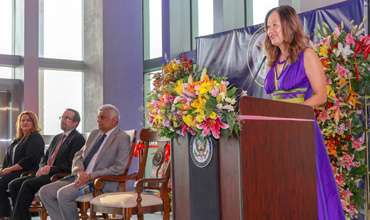Biggest Ever Global Experiment on How Nature Can Recover if Given an Opportunity: COVID-19 Pandemic Takes Command!
 Humans are over exploiting their opportunities granted by “Mother Nature’ and are constantly changing the nature. George Perkins Marsh (1864) highlighted that, if the situation continues, the earth would be rendered no longer fit for human habitation.In 1972 “The Club of Rome” highlighted in their publication “Limits to growth” that if current trends continued, the global system would ‘overshoot’ and collapse by the year2000. If that was not to happen, both population and economic growth would have to cease.
Humans are over exploiting their opportunities granted by “Mother Nature’ and are constantly changing the nature. George Perkins Marsh (1864) highlighted that, if the situation continues, the earth would be rendered no longer fit for human habitation.In 1972 “The Club of Rome” highlighted in their publication “Limits to growth” that if current trends continued, the global system would ‘overshoot’ and collapse by the year2000. If that was not to happen, both population and economic growth would have to cease.
Life, as we know it, has changed beyond all recognition. The whole world is currently facing a complicated life struggle due to rapidlyspreading Covid-19 (Coronavirus) pandemic which has hit more than half of her loving sons and daughters.It has been detected in China on 17th November 2020 and a 55 year old man from Hubei Province could have been the first case.On 11th January 2020 China reportedthe first Corona death of a 61 yearsold man who visited a live animal market in Wuhan City.However, the disease has now spread to 210 countries including Italy, Spain, USA, United Kingdom and many South Asian Countries and all the countries are in a giant liferisk having nearly 1,08,000deaths and about 1,781,000confirmed cases at the time of writing this article.COVID-19 is causing global trade to be disrupted, flights are being cancelled, and many people are now working or staying at home. The world is facing a huge socio economic threat with this coronavirus outbreak as most of the economic centers and many active non sleeping cities of the world have been locked down with this rapidly spreading virus.However, it has been reported that Chinahas been able to control the Corona casesto a significant level by April 2010 and even it has been able to open the city of Wuhan with some restrictions.
While getting many pathetic records on the human beings with this worst situation, some tweeter and blog posts were appeared in the last few days regarding the impact of this outbreak on the environment. At one point one tweeter message on internet really touched my heart and directed me to a deep thinking. It was ‘Corona is the vaccine and we are virus of the nature’. This saying made me think to what extent we ourselves could be identified as the viruses in the environment.Normally a vaccine is injected to a particular living being as a medication to recover from a disease or a virus. However, here the word implies another deep meaning which we all should pay attention to. Although this coronavirus pandemic has been a period of lockdown for the minds of the people and to the complex networks and societies around them, it seems the environment is benefiting positively in some interesting and unexpected ways over the last few months. The less interference of man on the environment during this pandemic outbreak has allowed the nature to occupy its space unconditionally.
The deadly Corona virus is forcing the governments to lockdown many countries, cities or villages and bringing halt to many industries. Meanwhile, it is doing the biggest ever global experiment on impact of human activities on the environmentthat no researcher on earth can practically do, even if all the modern facilities are mobilized. It is proving the impact of activities of human on the environment beyond doubt by clearing the sky of polluted air, freeing the cities and waterways from pollution as reported by space agencies and environmental agencies. and even allowing some animals to freely come and occupy the cities which have restricted human movement. Ever since the coronavirus outbreak started, global air pollution has come down, especially in China with fewer cars and people on roads. More urban areas are slowly being reclaimed by nature. Satellite images released by NASA and the European Space Agency have indicated that air pollution over China has gone down since the coronavirus outbreak with the closure of factories and restricted transportation. This has contributed, in no small part, to the drop in air pollutants in many countries. The number of airborne pollutants like carbon dioxide, carbon monoxide, and nitrous oxides have been reduced. The last few weeks have shown a significant drop in polluting gases like nitrogen dioxide (NO2) which is mainly produced by car engines, power plants, and other industrial processes. One of the largest drops in the gas has been seen in Wuhan, Central China which has been under strict lockdown since January. “New York has had exceptionally high carbon monoxide numbers for the last year and a half,” said Columbia Professor RóisínCommane in an interview with the BBC. “And this is the cleanest I have ever seen it. It’s less than half of what we normally see in March.”
Another interesting effect on the environment has been a significant reduction in air travel. With many people around the world self-isolating voluntarily or by official edict, some major cities outside of China are also seeing their air quality improve. In places like Europe, air traffic has taken a serious nosedive. This is significantly improving air quality and reducing pollution in the skies above many countries of the world.
So far, Italy is one of the worst-hit countries, with over 101,000 cases of coronavirus and 11,000 deaths. The country has the second oldest population on earth, and the elderly and sick have been identified as most risky group affected by the virus. Elsewhere in Italy, data from the European Space Agency (ESA) has demonstrated a distinct drop in the air pollutant nitrogen dioxide between the months of January and March, when coronavirus first took hold.
In Venice, following the unexpected reduction of water traffic caused by boats and cruise ships, residents are noticing that the usually murky waters are becoming crystal clear. Venice, a UNESCO World Heritage site, has hardly recovered from extreme flooding in November of last year before it was inflicted with the coronavirus outbreak. Among this horrible cascade of events, optimistic images emerging from the lagoon city show lucid canals and the unprecedented return of swans, fish, and even dolphins to the city’s waters as gondola traffic has been brought to a halt.With tourists numbers drastically reduced because of the virus, the waters in Venice's canals are cleaner than they have been in living memory. With things like motorboats effectively "grounded", sediment churning and other water pollutants have dropped dramatically. In most areas of Venice, residents have been amazed by how clear the water has become.
With lockdown enforced all over the globe, the wildlife is not only thriving but nature is healing as well.Italian One of the Tweeter messengers who update their blog posts daily has witnessed a boar loitering in the streets, had tweeted, “Boars in the middle of my hometown, dolphins in the port of Cagliari, ducks in the fountains in Rome, Venice canals have now clean water full of fish. Air pollution dropped. Nature is reclaiming its spaces during quarantine in Italy.” What comes to mind when flipping through these interesting quotes is the incredible ability of nature to adapt to the changing of human habits.
The Taj Mahal, another World Heritage Site, announced that it has been closed to the public due to coronavirus concerns. Other iconic world landmarks that have shut down with the break of the pandemic include the Statue of Liberty, Grand Canyon West, Eiffel Tower, and the Coliseum in Rome.
Sri Lanka’s quality levels of air and water have improved due to restricted vehicle movements according to the NBRO. Colombo’s air quality levels stood at 96 as at 11 am on Saturday – meaning moderate, according to data provided by the air quality monitor of the US Embassy
As more and more people are put under lock-down around the world, energy consumption profiles in buildings are being disrupted. With many people now working from home domestic energy consumption is predicted to have risen sharply.It has been predicted that this has risen somewhere in the region of 6 to 8% in the U.S. alone. Conversely, with fewer people in commercial or educational buildings, their energy consumption should plummet by as much as a quarter to 30%. This will ultimately save energy as the increase in domestic use is more than compensated by the larger drop in commercial and educational building uses. It also has the knock-on effect of reducing the consumption of polluting fuels in power stations as demand falls.
What is highlighted by all these views bring us a notion on the environment which subjects to less concern of humans with this sudden unexpected outbreak which is rapidly spreading over the countries regardless of territorial boundaries. It’s unbelievable to see how in such a short time, the nature can adapt to changing human habits. Therefore, it is true to say that Coronavirus has hit the reset button of the entire world and has done the biggest experiment on environment pollution. Hopefully, this is something the world would remember once the pandemic is over, and apply to the ways we think about environmental policies moving forward.
Wathsala Gunathilake
Assistant Lecturer
Department of Geography
University of Colombo
-
Still No Comments Posted.















Leave Comments